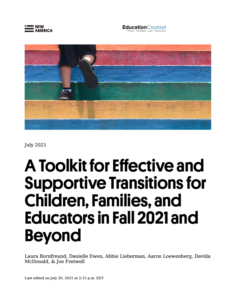A Toolkit for Effective and Supportive Transitions for Children, Families, and Educators in Fall 2021 and Beyond
Laura Bornfreund, Danielle Ewen, Abbie Lieberman, Aaron Loewenberg, Davida McDonald, & Joe Fretwell; New American, EducationCounsel
This toolkit from New America and EducationCounsel conceptualizes the system of transition in two main ways: (1) children’s transition from a home or community-based early childhood setting to the public school setting of pre-K, kindergarten, or the early elementary grades; and (2) children’s transition into a post-COVID learning environment both in fall 2021 and the years that follow.
The toolkit takes both a short-term and long-term view of strengthening transition. There are immediate steps needed to strengthen children’s transition this year and beyond. And this period of crisis and uncertainty presents a moment to reimagine children’s pre-K, kindergarten, and early grade experiences while also laying the foundation for improved, integrated systems across early care and education and K-12.
Officials in state government, local education agencies, and local government must work to create supportive and effective transitions. In coordination with early childhood stakeholders and advocates, local and state officials should prioritize policies that improve outcomes for the children, families, educators, and communities that have suffered the most disruptions and harm over the last year, while creating permanent changes to the ways children, families, caregivers, teachers, and other stakeholders experience the transition process.
While this toolkit focuses on what state and local officials should consider as they enact solutions, other entities play an important part in ensuring this work gets done. For example, state and local advocacy organizations should elevate underrecognized issues and those that need the most attention. Advocacy organizations can help connect decision-makers with educators and families. Philanthropy can help spur state and local innovation to find solutions to complex problems, make targeted investments for meaningful engagement with stakeholders in policymaking and implementation, and help sectors collaborate on the best ways to enable children, families, educators, and communities to thrive. Libraries and museums can be neutral places for families to gain information and experience. The sections that follow delve into challenges stemming from the COVID-19 pandemic that will impact future school years, and they provide state and local policy solutions. This period of crisis also presents a time to dramatically improve children’s transition into learning environments in early childhood and elementary education settings, value and support educators, and strengthen family wellbeing.
